
Request a full Catch Up® information brochure and details of our free information webinars
Find out more
The slimmed down English Curriculum, due to be taught from September 2014 for all years (excluding Y2 and Y6), can either be seen as a weight off our shoulders or a flimsy document lacking guidance! But either way, what does it have to say about pupils who are struggling with reading?
1. The division of Key Stage 2 Programmes of Study into two teaching blocks: Years 3 & 4 and Years 5 & 6, may be advantageous to SENCOs as it puts greater emphasis on evaluating progress on an intervention at a mid-point of Key Stage 2. Remember - Ofsted will not just ask ‘What interventions are you using?’ but ‘What is your evidence of their success?’ (NB Don’t forget the Excel spreadsheet on the Catch Up® website to help you present this data.)
2. Reading skills are divided into two processes: Word Reading and Comprehension. This division serves as an excellent reminder that the purpose of reading is to make sense of the printed word and that struggling readers need encouragement to develop comprehension alongside practising their decoding skills. It maps neatly on to the Catch Up® Literacy 15 minute individual session, where both decoding and comprehension are addressed.
3. There is even more emphasis than before on phonics with the assumption that word recognition skills are exclusively associated with blending and segmenting phonemes (including ‘common exception words’ – that’s what used to be called ‘tricky words’!) The curriculum also says that it is ‘essential’ that struggling readers are taught through a ‘rigorous and systematic phonics programme’. The assumption being that all these pupils need is more of the same (even though this has obviously not been a successful method for them in Key Stage 1). This means that accurate measurement of phonic knowledge through the 4 steps of phonic progression in the Catch Up® Literacy assessments may be even more important.
4. Fortunately, there’s plenty in the revised curriculum on reading for pleasure and the acknowledgement that pupils whose decoding skills are weak should have opportunities to listen to books appropriate for their age and interests and also have the chance to talk about them. A great way to do this is with story CDs, story websites and story Apps.
5. Another buzz phrase that comes up frequently is ‘vocabulary extension’. This is a good reminder to those of us who work with struggling readers. We may be so determined to assess how well their decoding is progressing, we forget the importance of discussing the meaning of words. This is crucial for the EAL learner who may have big gaps in their knowledge of the language. The prepared reading at the start of each Catch Up® Literacy session is a great opportunity to ensure the pupil understands the meaning of individual words and phrases.
Dee Reid, Catch Up® Consultant and Trainer
Catch Up® is the working name of The Caxton Trust, a not-for-profit charity registered in England and Wales (1072425) and Scotland (SC047557) as well as a company limited by guarantee (03476510). Catch Up is a registered trademark.
The Catch Up® Web site use "cookies" to help you personalise your online experience. A cookie is a text file that is placed on your hard disk by a Web page server. Cookies cannot be used to run programs or deliver viruses to your computer. Cookies are uniquely assigned to you, and can only be read by a web server in the domain that issued the cookie to you.
Click on the different category headings below to find out more. You can change your default settings very easily. To turn cookies on, click the button to the right. To turn cookies off, click the buttons to the left. Please read our cookie policy to find out more.
Performance monitoring cookies: Google Analytics cookies (_ga,_gid) - these can last up to 2 years.
Strictly necessary cookies used by the site content management system: PHPSESSID (used to record your logged in session) and allow_cookies (used to record that the user has consented to cookies) - these are either temporary (session) cookies or expire after no more than 30 minutes and are used to provide functionality as you navigate around the site and allow you to access secure areas.